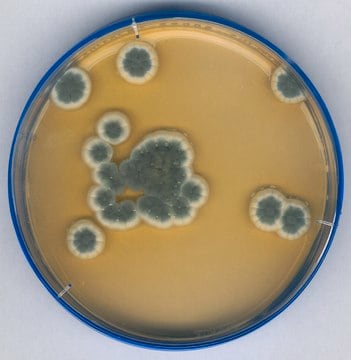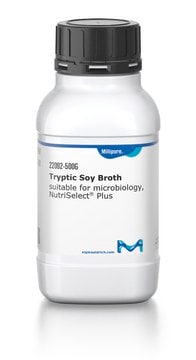1.08339
Sabouraud Dextrose broth
GranuCult® prime, Dextrose 2 %, according to EP, USP, JP, granular, for yeasts, for molds, pkg of 500 g
Synonym(s):
SDB, Sabouraud Dextrose Bouillon
About This Item
Recommended Products
Agency
JP
USP
according to EP
Quality Level
sterility
non-sterile
form
granular
composition
Dextrose, 2%
packaging
pkg of 500 g
manufacturer/tradename
GranuCult® prime
storage condition
dry media (Keep tightly closed)
technique(s)
microbiological culture: suitable
color
light yellow
pH
5.5-5.7 (22 °C, 30 g/L in H2O, after autoclaving)
solubility
30 g/L
bulk density
640 kg/m3
application(s)
clinical
microbiology
storage temp.
15-25°C
suitability
molds
yeasts
Looking for similar products? Visit Product Comparison Guide
General description
Application
Features and Benefits
- GranuCult® offers superior granulated culture media
- Safe and sustainable due to reduced risks associated with fine dust and toxic substance inhalation, resulting in a safer work environment
- Excellent wettability, solubility, and free-flowing properties
- Convenient, with minimal component separation and clumping, even under warm or humid conditions
- High batch-to-batch reproducibility
- Prolonged shelf life of up to five years
- High number of test strains exceeding all regulatory demands
- Granulation technology allows many supplements to be included, with no need to add these separately
Analysis Note
Appearance (colour): yellowish-brown
pH-value (25 °C): 5.4 - 5.8
Typical composition (g/litre): Peptone from meat 5.0; Peptone from casein 5.0; D(+)Glucose 20.0.
Growth (Trichophyton mentagrophytes ATCC 18748): good to very good
Growth (Trichophyton rubrum ATCC 28188): fair to good
Growth (Microsporum gallinae ATCC 12108): fair to good
Growth (Trichophyton ajelloi ATCC 28454): fair to good
Growth (Aspergillus brasiliensis (formerly A. niger) ATCC 16404 (WDCM 00053)): good to very good
Growth (Penicillium commune ATCC 10428): good to very good
Incubation: 7 days; 28°C
Growth promotion test in accordance with the harmonised method of EP, USP and JP.
Inoculum on reference medium (Candida albicans ATCC 10231 (WDCM 00054)): ≤ 100
Growth (Candida albicans ATCC 10231 (WDCM 00054)): fair to very good
Incubation: up to 3 days; 30-35°C
The information above is current at this time of publication and is subject to change without notice (except for customers holding a change control agreement with our company). The information/format can be altered at any time and inany way if internal company matters or Standard Regulationsdo say so.
Other Notes
- The appearance of the broth is clear and yellowish-brown.
- The pH value at 25 °C is in the range of 5.4-5.8.
Footnote
The designations basic, plus, or prime are added to indicate the quality control level, from basic quality control to standard QC plus to prime for full regulatory compliance.
Legal Information
related product
Storage Class Code
11 - Combustible Solids
WGK
WGK 3
Certificates of Analysis (COA)
Search for Certificates of Analysis (COA) by entering the products Lot/Batch Number. Lot and Batch Numbers can be found on a product’s label following the words ‘Lot’ or ‘Batch’.
Already Own This Product?
Find documentation for the products that you have recently purchased in the Document Library.
Articles
The different types of culture media, that are used to grow microorganisms in the laboratory for quality control, are classified by several criteria, such as consistency, composition, or selectivity.
The different types of culture media, that are used to grow microorganisms in the laboratory for quality control, are classified by several criteria, such as consistency, composition, or selectivity.
The different types of culture media, that are used to grow microorganisms in the laboratory for quality control, are classified by several criteria, such as consistency, composition, or selectivity.
The different types of culture media, that are used to grow microorganisms in the laboratory for quality control, are classified by several criteria, such as consistency, composition, or selectivity.
Our team of scientists has experience in all areas of research including Life Science, Material Science, Chemical Synthesis, Chromatography, Analytical and many others.
Contact Technical Service







